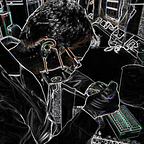Popular physiology I: The Body
For all practical purposes you are your body. Extracorporeal entities, like the ‘soul’, are accepted in some faiths, not in others (such as Buddhism & Marxism). Even the faiths which accept the soul (such as Christianity, Hinduism and many other cultures) differ in the manner they think the soul works. The Body, however, is indisputable. It is the terra firma upon which all human endeavours are laid upon.
Over the course of human evolution, little has changed in The Body. Technology has transformed the environment that we live in, yet has made very little inroads into our insides. The Body is unchanging, stubborn, rude. The uber rich can hire an army of servants attending to all his needs (and I use the male pronoun because most of the uber rich are men); he can lie around in his personal couch in his personal island in his personal sea all day. Yet his bodily functions are his and his alone. He must eat, sleep, excrete and reproduce — at least if he wants to enjoy any part of it — all by himself; these are tasks which refuse to be delegated.
The Body puts rigid, hard limits on human enterprise. However strong-willed a person may be, he cannot bend his elbow backwards, or swallow with his mouth open. In the present era of malleable tools, soft robots and adaptable AI, the design of The Body feels positively primitive. A small hemorrhage at just the right spot in the brain can leave a person half-paralysed for the rest of his life. Which seems unfair, to say the least. Once a knee is deranged it never really recovers its full function. A broken bone never recovers its original shape. A damaged retina leaves one blind for life. Unlike a modern gadget, the body is not modular; it’s not an assembly of spare parts. It’s one whole, and it can function only as a whole. Attempts to make the body modular — cybernetics — is still the stuff of science fiction. Sure, you can transplant a few organs, put implants in broken bones and replace knees with metal, but that’s about it. Surgical techniques have not yet managed to join individual neurons, let alone produce a prosthetic hand that moves at your will. If you lose your hand, the best the doctor can do is pick up the severed hand as quickly as possible, sew the nerves, vessels, muscles and bones together, and pray that individual neurons join on their own.
One may feel that the body is badly designed and hastily built; it is not. Unlike human technology, which builds by assembling spare parts from outside, the body is built from the inside. We start life as a single cell — the zygote (‘yolk’)— in our mother’s womb, which grows into each of us, a whole person. And The Body replenishes itself continuously. None of the atoms in the zygote remain in the adult, all of them have been replaced, and many more atoms have been added. And the process goes on till you die. Every day it’s a new you. This is the reason the typical body will last for sixty to seventy years, whereas a typical car is said to be exceptionally well built if it lasts fifteen years.
Human civilisation has evolved from the manual to the intellectual; we now believe that somehow our capability to reason, understand and articulate is more important to our survival than our ability to run, jump, lift and shoot. From hunter gatherer to agrarian socities, we are now a clan of information processing individuals. And we have alienated our own bodies. The more cerebrally inclined among us — the gamers, the bloggers, the youtubers, the armchair activists —seem to have distanced their bodies from themselves. They would rather prefer that their brains be immeresed in a vat of saline, connected to the internet through a neural link, and their physical bodies completely disposed off. At the opposite extreme — the gym freaks, the influencers, the wannabe celebrities , the showmen (and women) — have developed a transactional relationship with their own bodies; they design and sculpt their body as a tool, a device which suits their specific business model. In both cases, the corporal has taken a back seat to the cerebral, and human civilisation is fast moving towards a completely intellectual existence.
I plan to examine The Body from the only viewpoint that makes sense, i.e. that of evolution. The Body is old, the culmination of millions of years of metamorphosis, from the first proto-organism to this day. Yet The Body is also new, renewed with every breath, reinvigorated with every heartbeat. Physiology — how The Body works — is the very first discipline that humans ever studied, and the very first thing every child becomes aware of. And that is how we’ll approach the subject, from intuition to evolution.
